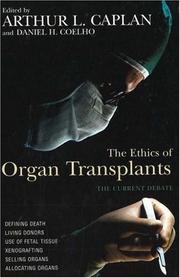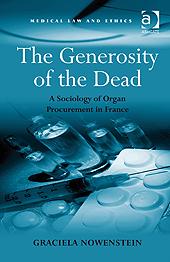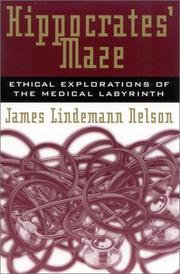| Listing 1 - 10 of 17 | << page >> |
Sort by
|
Book
ISBN: 9789046550083 9046550087 Year: 2013 Volume: *6 Publisher: Mechelen Kluwer
Abstract | Keywords | Export | Availability | Bookmark
 Loading...
Loading...Choose an application
- Reference Manager
- EndNote
- RefWorks (Direct export to RefWorks)
Orgaantransplantatie heeft een belangrijke plaats in de medische praktijk ingenomen. Met orgaantransplantatie gaan evenwel verschillende ethisch-juridische problemen gepaard, eens te meer wegens het grote tekort aan transplanteerbare organen. Onder welke voorwaarden mogen organen bij levenden, dan wel overledenen weggenomen worden? Welke patiënt krijgt het weggenomen orgaan? Welke kwaliteits- en veiligheidsregels moeten worden opgelegd? Antwoorden op deze vragen kunnen gevonden worden in de wet van 13 juni 1986 betreffende het wegnemen en transplanteren van organen (de ‘Orgaantransplantatiewet’).Deze bijdrage tracht dit juridisch kader op een heldere en onderbouwde wijze uiteen te zetten. De artikelsgewijze aanpak wil zowel juristen, als gezondheidszorgprofessionals en zelfs leken toelaten om snel een antwoord te vinden op concrete vragen over de toepassing van de wet en de bijhorende koninklijke besluiten.
Medical law --- Belgium --- Médecine --- Transplantation (chirurgie) --- Droit --- orgaantransplantatie (allocatie van organen, donorschaarste) --- recht (wetgeving, rechtspraak, rechtsbeginselen, juridische aspecten, aansprakelijkheid) --- gezondheidsrecht --- orgaantransplantatie --- europe --- legislation --- sante publique --- transplantation d'organes (greffe d'organes, pénurie d'organes, allocation d'organes) --- droit (aspects juridiques, législation, jurisprudence, principes de droit, responsabilité) --- europa --- wetgeving --- volksgezondheid --- Droit médical --- Belgique

ISBN: 1573922242 Year: 1998 Publisher: Amherst Prometheus Books
Abstract | Keywords | Export | Availability | Bookmark
 Loading...
Loading...Choose an application
- Reference Manager
- EndNote
- RefWorks (Direct export to RefWorks)
"With more than thirty of the most important, influential, and up-to-date articles from leaders in ethics, medicine, sociology, law, and politics, The Ethics of Organ Transplants examines the numerous and tangled issues that surround the debate over organ procurement and distribution: the search for new sources of organs, new methods of procurement, new ways of managing dying, and innovative strategies for fairly distributing this scarce life-saving resource."--Jacket.
orgaantransplantatie (allocatie van organen, donorschaarste) --- transplantation d'organes (greffe d'organes, pénurie d'organes, allocation d'organes) --- Medical ethics. --- Transplantation of organs, tissues, etc. --- Moral and ethical aspects. --- Medical ethics --- Transplantation of organs, tissues, etc --- Biomedical ethics --- Clinical ethics --- Ethics, Medical --- Health care ethics --- Medical care --- Medicine --- Bioethics --- Professional ethics --- Nursing ethics --- Social medicine --- Moral and ethical aspects --- Moral and religious aspects

ISBN: 9780754674320 9780754691181 9781315557823 9781317030775 9781317030782 9781138260085 Year: 2010 Publisher: Farnham Ashgate
Abstract | Keywords | Export | Availability | Bookmark
 Loading...
Loading...Choose an application
- Reference Manager
- EndNote
- RefWorks (Direct export to RefWorks)
How this is dealt with in practice reveals much about the state and nature of social solidarity; the changing legitimacy and scope of projects of social engineering via the law, and thereby the changing nature of the citizen-state relationship; the legitimacy of state intervention in mourning situations and state discretion in the use of corpses; and recent modifications of the status of medical professionals as figures of authority and agents of state policy. This title will be a valuable resource for researchers, academics, policy-makers and practitioners with an interest in this complex and topical subject. This volume draws on the French experience to examine the on-going international debate surrounding organ procurement. Commentators have tried to explain the dramatic differences in procurement rates in different countries in terms of legal variables, highlighting the variety of legal systems regulating consent. The general assumption has been that Presumed Consent (opting-out) systems produce better results than Express Consent (opting-in) systems. This study uses the French case to challenge this widely held assumption. The author argues that the French presumed consent systems coexist with patterns of behaviour that in practice do not mobilize the law. It is suggested that cultural, contextual and relational factors explain differences between procurement rates rather than the legal ones. The book explores four areas that are key to current research in socio-legal studies: presumed consent systems to organ donation assume generosity between anonymous citizens.
Sociology of health --- Medical law --- France --- Donation of organs, tissues, etc --- Frankrijk --- orgaantransplantatie (allocatie van organen, donorschaarste) --- sociologie (sociologische aspecten) --- Anatomical gifts --- Organ donation --- Organs (Anatomy) --- Tissue donation --- Tissues --- Law and legislation --- Social aspects --- transplantation d'organes (greffe d'organes, pénurie d'organes, allocation d'organes) --- sociologie (aspects sociologiques) --- Donation

ISBN: 0754620298 Year: 1999 Publisher: Aldershot Ashgate
Abstract | Keywords | Export | Availability | Bookmark
 Loading...
Loading...Choose an application
- Reference Manager
- EndNote
- RefWorks (Direct export to RefWorks)
A global comparison and analysis of the law relating to LDT. The work systematically analyzes the key ethical and legal issues in LDT, aided by data from transplant professionals, living donors and recipients. Extensive increases in LDT are shown to be necessary and feasible. This work is a global comparison and analysis of law relating to LDT. It also systematically analyzes the key ethical and legal issues in LDT. Aided by data from a programme of interviews with and questionnaires from transplant professionals, living donors and recipients, the book reaches conclusion as to the feasibility and need for increasing use of LDT in the light of current practice and attitudes and the growing shortage in kidneys (amongst other organs). Extensive increases in LDT use are shown to be necessary and feasibly achievable without compromising high ethical and legal standards. Detailed recommendations are made for the regulation of LDT.
Medical law --- Professional ethics. Deontology --- Transplantation of organs, tissues, etc. --- Law and legislation. --- Moral and ethical aspects. --- Living Donors --- Organ Transplantation --- Ethics, Medical. --- levende donor --- orgaantransplantatie (allocatie van organen, donorschaarste) --- Medical Ethics --- Medicine --- Professionalism --- Bioethics --- Grafting, Organ --- Transplantation, Organ --- Graftings, Organ --- Organ Grafting --- Organ Graftings --- Organ Transplantations --- Transplantations, Organ --- Transplantation --- Donors, Living --- Donor, Living --- Living Donor --- Medical laws and legislation --- legislation and jurisprudence. --- donneur vivant --- transplantation d'organes (greffe d'organes, pénurie d'organes, allocation d'organes) --- ethics --- Moral and religious aspects --- Transplantation of organs, tissues, etc --- Ethics, Medical --- Law and legislation --- Moral and ethical aspects --- legislation and jurisprudence

ISBN: 0742513858 Year: 2003 Publisher: Totowa Rowman & Littlefield
Abstract | Keywords | Export | Availability | Bookmark
 Loading...
Loading...Choose an application
- Reference Manager
- EndNote
- RefWorks (Direct export to RefWorks)
To contain the Minotaur, the ancient artificer Daedalus crafted a maze so intricate that it bewildered even its maker. Contemporary medicine-'Hippocrates' Maze-is every bit as bewildering, so much so that a new and distinct field, bioethics, has been created to help professional caregivers, patients, and families navigate their way through it. In Nelson's typically inviting and graceful style, the essays collected in Hippocrates' Maze explore the labyrinth of contemporary health care, and arrive at some unusual findings about death and decisionmaking, justice and families, cloning and kinship, and organ donation and intimacy. However, the book's most distinctive conclusions concern bioethics itself: the field is not best seen solely as a source of good advice to doctors, but rather as a way of better understanding our humanity.
bio-ethiek (medische, biomedische ethiek, bio-ethische aspecten) --- filosofie (filosofische aspecten) --- prenatale diagnostiek (prenatale test) --- identiteit --- familie (rol van de familie, familieleden, naasten, verwanten, nabestaanden) --- orgaantransplantatie (allocatie van organen, donorschaarste) --- kloneren (klonen, therapeutisch kloneren, reproductief kloneren) --- bioéthique (éthique médicale, biomédicale, aspects bioéthiques) --- philosophie (aspects philosophiques) --- diagnostic prénatal (test prénatal, DPN) --- identité --- famille (rôle de la famille, membres de la famille, proche parents, dépendants) --- transplantation d'organes (greffe d'organes, pénurie d'organes, allocation d'organes) --- clonage (clonage thérapeutique, clonage reproductif) --- Medical ethics. --- Medical ethics --- Biomedical ethics --- Clinical ethics --- Ethics, Medical --- Health care ethics --- Medical care --- Medicine --- Moral and ethical aspects --- Bioethics --- Professional ethics --- Nursing ethics --- Social medicine
Book
ISBN: 9780199739172 019973917X Year: 2012 Publisher: Oxford: Oxford university press,
Abstract | Keywords | Export | Availability | Bookmark
 Loading...
Loading...Choose an application
- Reference Manager
- EndNote
- RefWorks (Direct export to RefWorks)
In Death, Dying, and Organ Transplantation: Reconstructing Medical Ethics at the End of Life, Miller and Truog challenge fundamental doctrines of established medical ethics. They argue that the routine practice of stopping life support technology in hospitals causes the death of patients and that donors of vital organs (hearts, lungs, liver, and both kidneys) are not really dead at the time that their organs are removed for life-saving transplantation. These practices are ethically legitimate but are not compatible with traditional rules of medical ethics that doctors must not intentionally cause the death of their patients and that vital organs can be obtained for transplantation only from dead donors. In this book Miller and Truog undertake an ethical examination that aims to honestly face the reality of medical practices at the end of life. They expose the misconception that stopping life support merely allows patients to die from their medical conditions, and they dispute the accuracy of determining death of hospitalized patients on the basis of a diagnosis of "brain death" prior to vital organ donation. After detailing the factual and conceptual errors surrounding current practices of determining death for the purpose of organ donation, the authors develop a novel ethical account of procuring vital organs. In the context of reasonable plans to withdraw life support, still-living patients are not harmed or wronged by organ donation prior to their death, provided that valid consent has been obtained for stopping treatment and for organ donation. Recognizing practical difficulties in facing the truth regarding organ donation, the authors also develop a pragmatic alternative account based on the concept of transparent legal fictions. In sum, Miller and Truog argue that in order to preserve the legitimacy of end-of-life practices, we need to reconstruct medical ethics.
Euthanasia --- Procurement of organs, tissues, etc. --- Withholding Treatment --- Ethics, Medical --- Euthanasia, Active --- Tissue and Organ Procurement --- Moral and ethical aspects --- ethics --- Procurement of organs, tissues, etc --- dood (vaststelling van overlijden, hersendood, hart- en longfalen) --- euthanasie --- orgaandonatie --- orgaantransplantatie (allocatie van organen, donorschaarste) --- stopzetting van behandeling --- Organ procurement (Surgery) --- Tissue procurement (Surgery) --- Tissue banks --- Transplantation of organs, tissues, etc. --- mort (constat de décès, mort cérébrale) --- don d'organes --- transplantation d'organes (greffe d'organes, pénurie d'organes, allocation d'organes) --- arrêt de traitement --- Euthanasia - Moral and ethical aspects --- Procurement of organs, tissues, etc. - Moral and ethical aspects --- Withholding Treatment - ethics --- Euthanasia, Active - ethics --- Tissue and Organ Procurement - ethics
Book
ISBN: 2738104401 9782738104403 Year: 1996 Publisher: Paris: Éditions Odile Jacob,
Abstract | Keywords | Export | Availability | Bookmark
 Loading...
Loading...Choose an application
- Reference Manager
- EndNote
- RefWorks (Direct export to RefWorks)
Bioethics --- Genetic engineering --- Medical ethics --- Science --- Bioéthique --- Génie génétique --- Ethique médicale --- Sciences --- Moral and ethical aspects --- Aspect moral --- --Génétique --- --Éthique --- --Médecine --- --kinderloosheid --- kinderen --- reproductief recht (recht om zich voort te planten, recht op een kind) --- reproductieve technologie (voortplantingstechnologie, medisch begeleide voortplanting, MBV, artificiële voortplanting, kunstmatige voortplanting) --- adoptie --- prenatale diagnostiek (prenatale test) --- recht op waardig sterven --- aids (HIV) --- orgaantransplantatie (allocatie van organen, donorschaarste) --- sociaal-politieke aspecten --- biopolitiek --- impossibilité d'avoir des enfants --- enfants --- droit reproductif (droit de procréer, droit à la procréation, droits de la reproduction, droit à l'enfant) --- technique de reproduction (technique de procréation, procréation médicalement assistée, PMA, procréation artificielle) --- adoption --- diagnostic prénatal (test prénatal, DPN) --- droit de mourir dans la dignité --- sida (VIH) --- transplantation d'organes (greffe d'organes, pénurie d'organes, allocation d'organes) --- aspects socio-politiques --- biopolitique --- kinderloosheid --- --Bioéthique --- Bioéthique --- Génie génétique --- Ethique médicale --- --Bioethics --- Génétique --- Éthique --- Médecine --- Éthique des médecins --- Éthique médicale --- Politique sanitaire --- Santé publique --- Recherche
Book
ISSN: 12753653 ISBN: 9782296112223 2296112226 Year: 2010 Publisher: Paris : Harmattan,
Abstract | Keywords | Export | Availability | Bookmark
 Loading...
Loading...Choose an application
- Reference Manager
- EndNote
- RefWorks (Direct export to RefWorks)
En 2008, en France, 222 patients sont décédés faute d'avoir reçu un greffon à temps, alors que seulement 4 620 greffes avaient été réalisées pour 13 687 personnes en attente. La pénurie est particulièrement aiguë pour les malades qui ont besoin d'un rein : on compte en moyenne seulement 1 greffon disponible pour 3 malades. Cette situation est assez générale en Europe, mais moins grave dans certains pays qui ont su développer, de différentes manières, une plus grande mobilisation des deux sources de greffons : les donneurs décédés et les donneurs vivants. Le séminaire qui s'est tenu à Paris les 6 et 7 mai 2009 s'est proposé de contribuer à la réflexion des autorités en charge de la révision des lois de bioéthique ainsi que, plus généralement, des milieux médicaux et de l'opinion publique, en apportant un éclairage européen sur les solutions possibles au déficit constaté. Des personnalités faisant autorité - médecins et chirurgiens, mais aussi juristes, sociologues, philosophes et responsables administratifs venant d'Allemagne, d'Espagne, d'Italie, de Grande-Bretagne, de Norvège, des Pays-Bas et de Suède - ont été invitées à présenter leurs expériences et à débattre des aspects éthiques associés, en présence de leurs homologues français et de responsables politiques. Cet ouvrage transcrit les interventions et les débats, souvent vifs, qui les ont suivies.
Organ Transplantation --- Tissue and Organ Procurement --- Bioethics --- Procurement of organs, tissues, etc --- Donation of organs, tissues, etc --- ethics --- Government policy --- Moral and ethical aspects --- Social aspects --- Procurement of organs, tissues, etc. --- Donation of organs, tissues, etc. --- orgaandonatie --- orgaantransplantatie (allocatie van organen, donorschaarste) --- don d'organes --- transplantation d'organes (greffe d'organes, pénurie d'organes, allocation d'organes) --- Conferences - Meetings --- Anatomical gifts --- Organ donation --- Organs (Anatomy) --- Tissue donation --- Tissues --- Organ procurement (Surgery) --- Tissue procurement (Surgery) --- Tissue banks --- Transplantation of organs, tissues, etc. --- Donation --- Organ Transplantation - ethics - Europe --- Tissue and Organ Procurement - ethics - Europe --- Bioethics - Europe --- Procurement of organs, tissues, etc - Government policy - France - Congresses --- Donation of organs, tissues, etc - Government policy - Europe - Congresses --- Procurement of organs, tissues, etc - Moral and ethical aspects - Europe - Congresses --- Donation of organs, tissues, etc - Social aspects - Europe - Congresses --- Procurement of organs, tissues, etc - Social aspects - Europe - Congresses --- Donation of organs, tissues, etc - Moral and ethical aspects - Europe - Congresses --- Medical bioethics --- Organ transplantation --- Philosophy of law --- Scarcity --- Transplants
Book
ISBN: 9780195311594 9780199892617 019989261X 1282544225 9786612544224 0199718571 0195311590 0199870713 Year: 2010 Publisher: Oxford Oxford University Press
Abstract | Keywords | Export | Availability | Bookmark
 Loading...
Loading...Choose an application
- Reference Manager
- EndNote
- RefWorks (Direct export to RefWorks)
What's wrong with markets in everything? Markets today are widely recognized as the most efficient way in general to organize production and distribution in a complex economy. And with the collapse of communism and rise of globalization, it's no surprise that markets and the political theories supporting them have seen a considerable resurgence. For many, markets are an all-purpose remedy for the deadening effects of bureaucracy and state control. But what about those markets we might label noxious-markets in addictive drugs, say, or in sex, weapons, child labor, or human organs? Such markets arouse widespread discomfort and often revulsion. In Why Some Things Should Not Be for Sale, philosopher Debra Satz takes a penetrating look at those commodity exchanges that strike most of us as problematic. What considerations, she asks, ought to guide the debates about such markets? What is it about a market involving prostitution or the sale of kidneys that makes it morally objectionable? How is a market in weapons or pollution different than a market in soybeans or automobiles? Are laws and social policies banning the more noxious markets necessarily the best responses to them?Satz contends that categories previously used by philosophers and economists are of limited utility in addressing such questions because they have assumed markets to be homogenous. Accordingly, she offers a broader and more nuanced view of markets-one that goes beyond the usual discussions of efficiency and distributional equality-to show how markets shape our culture, foster or thwart human development, and create and support structures of power. An accessibly written work that will engage not only philosophers but also political scientists, economists, legal scholars, and public policy experts, this book is a significant contribution to ongoing discussions about the place of markets in a democratic society.
gezondheidseconomie (gezondheidszorgeconomie) --- commercialisering van het menselijk lichaam (orgaanhandel) --- orgaantransplantatie (allocatie van organen, donorschaarste) --- sociaal-politieke aspecten --- ethiek (ethische aspecten) --- économie de la santé (économie des soins de santé) --- commercialisation du corps humain (commerce d'organes) --- transplantation d'organes (greffe d'organes, pénurie d'organes, allocation d'organes) --- aspects socio-politiques --- ethique (aspects ethiques) --- Free enterprise --- Capitalism --- Moral and ethical aspects. --- 330.02 --- Moraal en ethiek (algemeenheden). --- Theorie van de economische kringloop. --- Professional ethics. Deontology --- Moral and ethical aspects --- #GBIB:CBMER --- 170 --- 174 --- AA / International- internationaal --- Moraal en ethiek (algemeenheden) --- Verband tussen de ethiek en de economie. Ethiek en bedrijf --- Theorie van de economische kringloop --- Free enterprise - Moral and ethical aspects --- Capitalism - Moral and ethical aspects

ISBN: 026266142X Year: 1998 Publisher: Cambridge Mit Press
Abstract | Keywords | Export | Availability | Bookmark
 Loading...
Loading...Choose an application
- Reference Manager
- EndNote
- RefWorks (Direct export to RefWorks)
In the second volume of his trilogy, Petrinovich presents a detailed account of the dilemmas that humans in technologically advanced societies face when confronted by matters of life, death, and medical treatment. The issues he discusses include genetic screening, the Human Genome Project, criteria for defining death, organ donation and transplantation, and assisted suicide and euthanasia. Petrinovich also discusses healthcare policy issues such as the allocation of scarce medical resources and rationing. He argues for adequate health care as a fundamental moral necessity and makes a number of policy recommendations.
Medical ethics. --- bio-ethiek (medische, biomedische ethiek, bio-ethische aspecten) --- biologie(biologische aspecten) --- evolutietheorie (darwinisme) --- cognitivisme --- neurowetenschappen --- moraliteit (moraalkritiek) --- genetische screening --- menselijk genoom --- dood (vaststelling van overlijden, hersendood, hart- en longfalen) --- orgaantransplantatie (allocatie van organen, donorschaarste) --- euthanasie --- deontologie (plichtenleer, deontologische code, deontologische richtlijn, professionele integriteit) --- gezondheidszorgbeleid (gezondheidszorghervorming, gezondheidszorgsysteem) --- Verenigde Staten --- bioéthique (éthique médicale, biomédicale, aspects bioéthiques) --- biologie(aspects biologiques) --- théorie de l'évolution (darwinisme) --- neurosciences --- moralité (critique morale) --- dépistage génétique --- génome humain --- mort (constat de décès, mort cérébrale) --- transplantation d'organes (greffe d'organes, pénurie d'organes, allocation d'organes) --- déontologie (code de déontologie, code de conduite, code de pratiques) --- politique des soins de santé (réforme des soins de santé, système des soins de santé) --- Etats Unis --- Medical ethics --- Biomedical ethics --- Clinical ethics --- Ethics, Medical --- Health care ethics --- Medical care --- Medicine --- Moral and ethical aspects --- Bioethics --- Professional ethics --- Nursing ethics --- Social medicine
| Listing 1 - 10 of 17 | << page >> |
Sort by
|

 Search
Search Feedback
Feedback About UniCat
About UniCat  Help
Help News
News